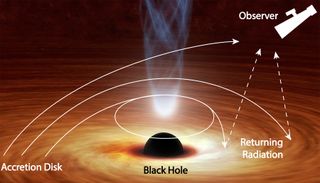This weird black hole is bending light back on itself like a boomerang

For decades, scientists have suspected that some of the light that escapes from around massive black holes nearly doesn't make it — and now, they've finally seen it happen.
That's according to scientists who conducted a new analysis of old observations of a black hole feeding on a sunlike star. The researchers focused on measurements of the black hole's disk, where light escaping from the black hole shines. Specifically, the scientists teased apart, on the one hand, light that was coming directly from the disk, and on the other, light that failed to escape the disk and got pulled back toward the black hole before being reflected out into space.
"We observed light coming from very close to the black hole that is trying to escape, but instead is pulled right back by the black hole like a boomerang," Riley Connors, lead author of the new research and a physicist at Caltech, said in a statement. "This is something that was predicted in the 1970s, but hadn't been shown until now."
Related: No escape: Dive into a black hole (infographic)
The team relied on observations gathered by NASA's Rossi X-ray Timing Explorer, which observed black holes and neutron stars. The spacecraft launched in 1995 and took its last data in 2012.
Specifically, the scientists used observations taken during a series of outbursts that the black hole and its sunlike star, a binary system formally known as XTE J1550-564, experienced between 1998 and 2000. That data suggested that some of the X-ray light observed at the time wasn't directly escaping from the black hole but instead dodged the black hole by reflecting off the light in the accretion disk that is being pulled toward the black hole.
The observations could help scientists better understand what black holes are doing, an ongoing mystery in astronomy. "Since black holes can potentially spin very fast, they not only bend the light but twist it," Connors said. "These recent observations are another piece in the puzzle of trying to figure out how fast black holes spin."
Get the Space.com Newsletter
Breaking space news, the latest updates on rocket launches, skywatching events and more!
And the new work is also satisfying when considering the history of black hole research. Not only was the effect predicted more than 40 years ago, it also offers additional support for Albert Einstein's general theory of relativity, the scientists said in the statement.
"The disk is essentially illuminating itself," Javier Garcia, a physicist at Caltech and co-author of the new research, said in the same statement. "Theorists had predicted what fraction of the light would bend back on the disk, and now, for the first time, we have confirmed those predictions."
The research is described in a paper posted to the preprint server arXiv.org on March 30 and accepted for publication in The Astrophysical Journal.
- Why are black holes so weird? 'Ask a Spaceman' explains in new episode
- All your questions about the new black hole image answered
- Weird black hole physics revealed in NASA visualization
Email Meghan Bartels at mbartels@space.com or follow her @meghanbartels. Follow us on Twitter @Spacedotcom and on Facebook.
OFFER: Save 45% on 'All About Space' 'How it Works' and 'All About History'!
For a limited time, you can take out a digital subscription to any of our best-selling science magazines for just $2.38 per month, or 45% off the standard price for the first three months.
Join our Space Forums to keep talking space on the latest missions, night sky and more! And if you have a news tip, correction or comment, let us know at: community@space.com.

Meghan is a senior writer at Space.com and has more than five years' experience as a science journalist based in New York City. She joined Space.com in July 2018, with previous writing published in outlets including Newsweek and Audubon. Meghan earned an MA in science journalism from New York University and a BA in classics from Georgetown University, and in her free time she enjoys reading and visiting museums. Follow her on Twitter at @meghanbartels.

